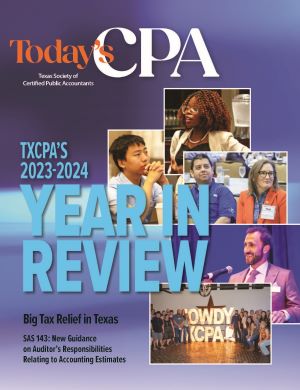May 10, 2024
With ASU 2023-08, FASB Moves to Address Accounting for Certain Crypto Assets
By Don Carpenter, MSAcc/CPA
Key Terms: Crypto Asset, ASU 2030-08, Distributed Ledger, Payment Tokens
In the last issue of Today’s CPA, we highlighted the struggle regulators face in categorizing crypto assets within the regulatory framework. (Please see “The Wild West: The Lasso is Out for Crypto,” March/April 2024 Today’s CPA). As these issues continue to evolve, FASB has taken steps to bring transparency to certain classes of crypto assets that will give stakeholders improved visibility into their impact on reporting entities.
Under the FASB framework, crypto assets are categorized as intangible assets. As such, they have been included in the accounting framework as indefinite-lived assets subject to impairment testing. Increases in value or recovery of prior impairments are not reported.
By requiring fair value reporting of certain crypto assets, ASU 2030-08 moves away from this framework. This approach is not without precedent, as fair value reporting has been required for other assets under industry-specific guidance such as for investment companies for some time.
The guidance only applies to crypto assets that do not provide the holder with enforceable rights to, or claims on, underlying goods, services or other assets. As described in the prior article, this would include “payment tokens” but presumably not apply to “security” or “utility” tokens.
The crypto asset must be created or reside on a distributed ledger such as blockchain and be secured through cryptography. In addition, it must be fungible, therefore allowing for an objective indication of its fair value. And finally, the asset cannot be created or issued by the reporting entity or its related parties. FASB clarified that the mining or validation of crypto assets does not make the entity the creator as defined in the ASU.
For crypto assets within the scope of the ASU, both annual and quarterly reporting must include:
- The name, cost basis, fair value and number of units for each significant crypto asset, and the aggregate fair value and cost basis of those not deemed individually significant.
- Contractual sale restrictions applicable to any reported crypto asset, the duration of such restrictions and the circumstances that would cause those restrictions to lapse.
In addition, annual reporting must include:
- A rollforward, in aggregate, of activity in the reporting period for crypto asset holdings, including additions (with a description of activities that resulted in the additions), dispositions, gain, and losses.
- The difference between price and cost basis for any dispositions as well as a description of the activity that resulted in the disposition.
- If not reported separately on the income statement, the line item that includes such amounts.
- The method of determining the cost basis of the asset.
Crypto assets will be required to be reported separately from other intangible assets on the balance sheet. The gains and losses from remeasurement will be included on the income statement and presented separately from other similar amounts. For cash flow reporting, any crypto asset received as payment in the ordinary course of business will be reported as operating cash flow if converted nearly immediately into cash (defined as within a matter of days). Otherwise, the conversion will be reported as cash from financing activities.
In reaching its conclusions, the Board noted that crypto assets differ from other categories of intangibles in several significant ways. Crypto assets are frequently traded while most intangibles are not typically marketable. Frequency of trade facilitates the establishment of fair value for many categories of crypto assets while at the same time complicating the requirement for impairment testing required under prior guidance. In addition, it is not uncommon for holders of significant value in crypto assets to voluntarily report fair value on at least an annual basis to investors.
The Board considered several alternatives to its final guidance. In lieu of fair value measurement, a modified impairment model was considered that would require impairment testing only once annually, eliminating interim fact-based testing. Reporting assets at net realizable value rather than fair value was also considered. The first alternative was rejected as it ignored increases in value and the latter would have resulted in different measurement basis between reporting entities.
In addition, the Board considered the treatment of transaction costs to acquire crypto assets such as commissions. A majority of the Board supported expensing transaction costs, as it would provide greater transparency to gains and losses arising from price changes and reduce differences between entities. However, some comments noted that this is a divergence from guidance in the treatment of transaction costs in other areas of GAAP.
Ultimately, the Board did not provide any specific guidance on transaction costs noting that regardless of whether these costs were capitalized or expensed at acquisition, the effect on income in the initial period would be unchanged.
The ASU is effective for all reporting entities for the first fiscal year beginning after December 15, 2024 (2025 for calendar year reporters). Early adoption is allowed but must be applied from the beginning of the fiscal year of adoption.
As is evident from these two articles, crypto has presented new challenges for regulators on several fronts. But equally true is the fact that reporting structures remain flexible enough to respond and adapt to the evolving business practices of a technology driven economy.

Related CPE:
2024 Crypto, Blockchain and Taxes Webcast - Multiple Dates
About the Author: Don Carpenter, MSAcc/CPA, is clinical professor of accounting at Baylor University. Contact him at Don_Carpenter@baylor.edu.






















